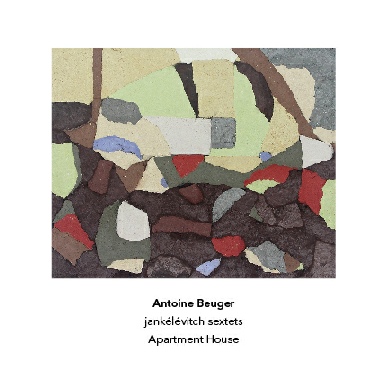Another Timbre TimHarrisonbre
at168 Antoine Beuger - ‘jankélévitch sextets’
Apartment House play Antoine Beuger’s exquisite hour-long piece from 2004. Wonderfully immersive and absorbing sounds that feel as if they are touching eternity.
James Opstad, double bass
Mark Knoop, accordion
Heather Roche, bass clarinet
Mira Benjamin, violin
Joe Qiu, bassoon
Bridget Carey, viola
Recorded in London, August 2020
Discussion between Antoine Beuger and composer Ian Power
Below are edited extracts from an extended discussion between the composers.
IP: Can you describe how you work - your process for coming up with an idea for a piece or working on a piece? What are your mental processes, but also what are your physical processes or routines?
AB: For quite some years, I’d never say that I’m working on a piece, because it really doesn’t feel like that. To me that feels similar to a pregnant woman saying that she’s ‘working on a child’. We laugh at that idea, but we don’t laugh when a composer says he’s working on a piece. But to me, it feels just as laughable, because what am I working on? It’s rather a process whereby a piece seems to gradually reveal itself to me. And the work is mostly just being attentive, receptive. To me, rather than having an idea, it feels more like an idea has me. And whenever that happens, then the work I have to do – and it’s a lot of work – is simply to do justice to the idea, or to let it open itself or impose itself as adequately or as respectfully as possible.
I think the main thing is to challenge the idea of what the creator does. It’s really tied up with a male idea of creating. So in Christian theology, which has of course had a huge impact on our whole development for the past 2,000 years, there seems to have been, from very early stages, an urge to presume that the creator is creating out of nothing, and also that he knows exactly what he’s doing. He comes up with a kind of a blueprint, or a score – it really is like a very contemporary music type of score. Nobody knows what it’s all about, but everybody knows exactly what they have to do. Only the composer knows what is the real deal in the piece, so the composer/creator is omnipotent. He is prescient in every sense, and he comes to the musicians and says, okay, here’s my score. And then they say, okay, tell me what you want. And he says this is what I want, and might give them a kind of job description, and it’s usually a difficult job in which they can easily fail and make mistakes, but they are going to do their very best and use all their professionalism to do it. And then at some point then the piece is created.
In French they use the word ‘creation’; the premiere is the creation of a piece. And this model, which is basically a centuries old theological model, still holds for the most part. And this is, I think, the reason why it’s difficult to imagine women as composers or creators. They are able to give birth, but they’re not able to create out of nothing. And so they are like matter, like nature. And this whole imagery that comes with women is also, of course, that you have to be very careful, very cautious, because they are seductive. They are drawing you into sin and into flesh.
And composers today, even young composers, think very seriously about themselves, and don’t want to have anything to do with playing. Like they’re not going to touch an instrument. That’s not their job. Other people get paid for that. The job of the creator is not to get their fingers dirty or to engage their breath or engage their body. They speak their word, and then the job is done by others. And by the end of that process, something like a sonic surface will have been transmitted or conveyed to the listener from the composer/creator. The musicians don’t really have any substantial role to play; they are not playing the music, they are performing the score. Or in Germany they now speak about ‘realising the score’. That’s what you do when you play a concert. You realise the score, and thus avoid the word ‘play’. Nobody says “I’m playing this piece by Lachenmann”. You don’t ‘play’ Lachenmann. At best you perform a piece, or realise the score as well as you can.
IP: So moving to the CD, first of all, who was Jankelevitch?
AB: He was a Russian philosopher, but he grew up and lived in France.
IP: Can you give a snippet of one of his ideas that really strikes you?
AB: Well, for example, he says that music has no itinerary. It’s not going from here to there to there, and then you arrive, but it’s an unpredictable flow. It just goes. And I agree with that.
And then the other concept that I find incredibly appealing is the idea of, in French it’s called [apparition disparaisante], ‘disappearing appearance’. So something appears by disappearing. And that is something that I feel is very much applicable to sound in general, because sounds always appear and disappear. And often it’s not really possible to say, is it disappearing right now, or still appearing? The disappearance and the appearance kind of overlap or become indiscernible. And this connects in philosophy with the concept of the event. The event being something that, well, if it happens, it has just happened. You can’t really grasp it, and you also can’t go back to before the event. Once you’re aware of it, it’s already happened. But one event can be like captured by an idea.
IP: Which speaks to the usefulness of transcribing an event in that sense. . .
AB: We can’t transcribe events. We can’t invent them or design them. We can only hope that they might happen. So if I’m thinking all day about this new piece or this new situation, and then I realise something has shifted, something has happened, but I don’t exactly remember when it came into my flesh, as it were. That is an event in that sense. And there is then no way of going back before it, but I know I have a lot of work to do, and there is going to be, what Badiou maybe calls this aleatory path of being consequential to what happened, like firming it up.
IP: What’s one important thing for someone to know about the ‘jankelevitch sextets’?
AB: Well it’s from a series of pieces I composed, each for a different number of players, from two to twenty. And the number in each piece is really important, because everything that happens can only happen in a situation where there are, in this case, six people. Of course, there is much more happening than what emerges from this number, but the question I was really involved with in this whole series was how is it to play with this particular number of musicians? It’s quite easy to see that to be two is somehow different from being three. But with five, six, seven, it becomes more—
IP: The difference starts to diminish a bit.
AB: Yes, it’s less easy to grasp the difference. But there will always be differences. For example, when you have a group with an odd number, because you cannot have two equal groups.
IP: And you can’t pair off either.
AB: Yes, you can’t just pair off. There will always be like one in the middle, or somewhere. So that’s an interesting thing about odd numbers. But with six players you can divide easily into three pairs or two trios, or you can build different kinds of groups. So in these pieces, I’m trying to find very easy, simple, basic conditions where being this particular number plays out.
Then basically, the players, in all these pieces, they do the same thing. They play long, very quiet tones. Just long to very long tones. Whether you play Dedekind Duos or Florenski Septets or even Tunings for Twenty, this is what you do. There’s nothing to practice, because individually everybody is engaging in the same activity. And they’re going to find themselves in different kinds of constellations, if you like. While playing, they find out, hey, this is somehow different from, say, the other piece we played the other day when we had one person less or more. It’s a very interesting experience, more like a social difference than a musical construction. And there’s a whole set of pages in the score which you play separately, so you have a whole number of instances of this situation, and you move from one to the other, and it’s basically very amorphous. But it takes on some kind of form each time, and the form comes very logically and genetically from the setup, from the deep structure, if you like. And in doing that, you gradually find out more and more about what is this landscape we are in now, what is this process of being with this number of players?
IP: It’s as though the attention is focused more on that learning than it would be in a score that is more determined with notes and rhythms. A conventional score focuses you more in the moment, so you’re not learning as the piece is going on as much as you are in a piece like this.
AB: Yes, you have a completely different focus. You find out, okay, at that point, I need to play that tone. I’d better do it, otherwise I’m going to ruin the ensemble sound. But you can’t predict it, or plan it ahead. Of course, it wouldn’t be difficult to make a kind of fully notated score that kind of transcribes into conventional notation one possible outcome. We sometimes even did that, or something like it, for people who felt more at home, at first, maybe, with that situation. And from the outside, it sounds the same, but playing that piece, or experiencing it from within, is completely different.
IP: I have one more question. I was reading another interview of yours, and you mentioned a fondness for Bruckner and going to see Bruckner symphonies once in a while. And I feel that when I was learning new music, Romanticism was taboo.
AB: Yes, in my time as well.
IP: But I feel like you’re not the first, if you want to say ‘experimentalist’, or even composer of more conventional new music, who is now more open about enjoying some Romantic music. And I include myself in this. Sometimes I feel like what I’m doing is a little bit the same thing that they were doing, but maybe distilled - an evocation of Romanticism via limited, focused materials and situations. I wondered if that’s similar for you, or are they just two totally different activities?
AB: I think Romanticism is still to be explored, and isn’t nearly well enough understood. I think it was Chris Newman, an English composer, who once said to someone, meaning to be negative about Wandelweiser, he said, well, you know, Wandelweiser is nothing but romanticised Cage. He wanted to be mean, but I thought, how right he is! Romanticised in the sense that Cage understood, in the context of the development of Western philosophy, and music, in the 19th century. Romanticism as a counter-movement to the Enlightenment. And we still take the Enlightenment for granted, like a premise. And we still aren’t willing to see the challenge in that. People like Adorno understood the difficulty with Enlightenment. They saw that the Enlightenment, not Romanticism, was the intellectual basis for fascism, and for industrialized killing and things like that. But still, everybody thinks that it’s Romanticism that leads directly to Hitler and to national socialism. The Enlightenment gives this sense of the possibility of being in control, where everything is premised upon rationality, technology and science - and a very constricted conception of science, in which the scientists know best. But they don’t really, they can’t give you unshakeable knowledge.
Like with coronavirus now, I’d be happier if there was some more Romanticism in our approach to the presence of a virus in our world. The reaction we usually have is, okay, let’s get rid of it. And, of course, we’re completely convinced that we can get rid of it, because we’re so great, with our technology and our knowledge. We’re going to find out what this virus is all about and then with vaccination or whatever we will get rid of it, and then we’re done. And the Romanticist would probably be more willing to say, wait a minute - this virus is there, and it’s not going to just go, we’re not going to get rid of it. It’s there because of us anyway, because everything is connected, and we destroyed its habitat, and it’s found a way out, and is trying to find another habitat. And then we’re flying around the world all the time, so of course everything that happens somewhere immediately spreads everywhere. And so we can’t just say, we don’t like you, go away. It’s not going to happen. It’s similar to our behaviour towards refugees. We can’t just get rid of them. They will come, and they keep coming more and more and more because that’s what needs to happen. These people have no choice. So why shouldn’t we learn that since everything is so connected, we should rather be a bit more humble, and find a way to live with this virus? Because that is what we will have to do anyway. Why stand up and say we are going to war against the virus, and throw our bombs or whatever at it to try to just get rid of it? That’s an illusion anyway.
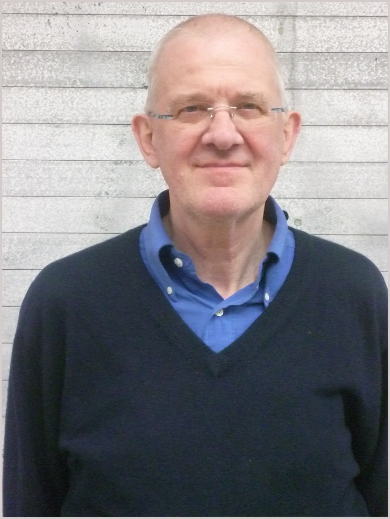
Antoine Beuger

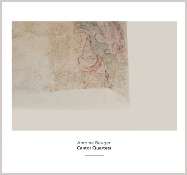


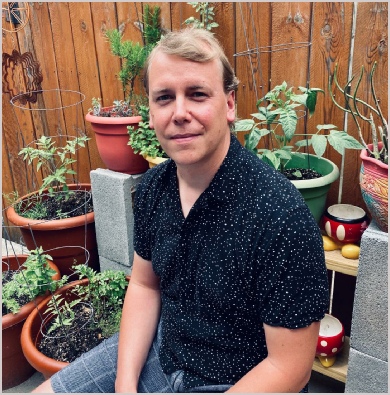
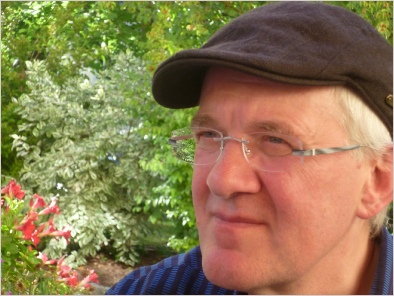
Three previous CDs featuring pieces in the same series as the
‘jankélévitch sextets’. Click on the covers for details
Ian Power
